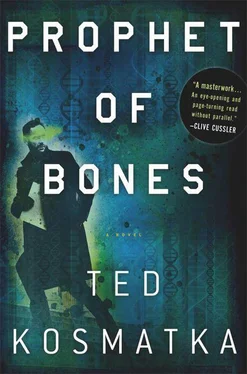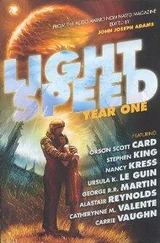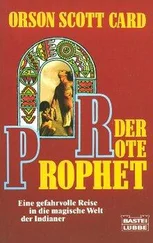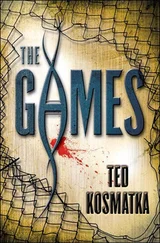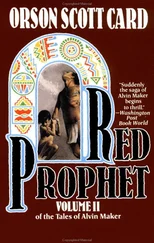He wasn’t one of the gene freaks. He couldn’t read the amino acid sequence like prose. But the answer was there, in the code.
Paul went to his desk and opened the top drawer. He rummaged through the detritus of past projects, odds and ends, looking for something.
There.
He found it. The card was white with a single black magnetic strip running along the back. A Westing security card.
All the Westing cards looked the same. The size of credit cards, they were utterly featureless, meant to be carried in a wallet. Paul had broken this one the previous winter, a day near zero, and the cheap plastic had cracked in his pocket, a fault line splitting the magnetic strip, rendering the card useless. He’d gotten a replacement card the same day but had forgotten to turn his old card in.
Paul looked at the printout again: an impenetrable sequence, a language he couldn’t understand. What he needed was the Rosetta stone to tell him what it meant.
He knew just where to find one.
“I’m good at Ping-Pong,” Paul told him.
“Really?” said Makato in monotone.
“I’m the best player I know.”
“You don’t say.”
“It’s true,” Paul said. “My reflexes are catlike. I may be the best player in this state.”
“Good for you.”
“Perhaps the world.”
They sat at the lunch table, eyeing each other across their half-eaten meals. Paul had heard about Makato and Ping-Pong.
“I’ve played a little Ping-Pong in my day,” Makato mentioned.
“Really?”
“Just a little,” Makato said.
“Are you good?”
“Who, me? No, I wouldn’t say I’m good. No. Below average. Far below average.”
“Perhaps we should play.”
“Oh, I wouldn’t be any competition.”
“Still, it would be fun,” Paul said.
“I wouldn’t want to bore you.”
“You won’t bore me. Maybe I could give you a few pointers.”
“It’s true I could use some instruction.”
“So you’ll play?” he asked.
Makato, who Paul knew well enough not to believe for a single nanosecond, said, “Sure.”
They met at the Omni Sports Center on Victoria Street after work the next night. The Ping-Pong tables were on the second floor. Paul wore a T-shirt and khaki cargo shorts. Makato arrived in a red track suit. Makato stretched before they started.
Paul knew he was in trouble from the very first serve.
They played for ninety minutes. Makato scored at will.
Paul discovered two things while he played Makato. First, that he could produce no volley that Makato could not return and, second, that Makato had the ability to make the ball dance in a way that Paul was certain defied all forms of physics other than quantum mechanics. Paul suspected the ball reverted to wave form during his various eye blinks when momentarily freed from the constraints of objective observation. In ninety minutes, Makato gave up seven points.
After Ping-Pong, they hit the steam room. Makato barely seemed to sweat. They sat on the hot wood while the steam opaqued the room around them. The steam worked its way into Paul’s skin. “You played well,” Makato told him.
“Hardly.”
“No, for an American, very good.”
After the steam room, they grabbed towels for the showers.
It was a simple thing to do. To lift Makato’s wallet.
He allowed himself to undress more slowly, and then Makato was naked, heading for the showers, and Paul opened his locker. They had the change room to themselves, so there were no witnesses to the theft. Paul pulled the wallet from Makato’s pants pocket. He noted the address on the driver’s license and then slid out the Westing security card. He put Makato’s card in his pocket and replaced it with the broken blank he’d retrieved from his drawer.
The cards were cheap plastic, and they often broke. It would not be a strange thing to open your wallet one day and find your card cracked and useless. It happened all the time. The guards would have your new card ready within an hour.
Makato would think nothing of it.
Paul closed the wallet and put it back in Makato’s pants. Then he hit the showers.
* * *
Later that night, MapQuest found the address.
Paul waited for three A.M., then drove with the windows down. The air smelled like rain.
Thankfully, there were no dogs barking in Makato’s neighborhood, and very few streetlamps.
There were several different ways this could go. Paul knew from Google Maps that Makato’s house had a garage. If his car was inside the garage, this would be difficult. If the car was parked outside, it would be easier.
Paul parked two blocks from Makato’s address. He turned his engine off. The Matrix’s headlights stayed on for a full minute. Paul waited, hating this. Car manufacturers obviously didn’t have stealth in mind when they designed their vehicles. In the old days, a criminal could turn his headlights off immediately. Heck, Paul was old enough to remember cars that you could actually driv e without your headlights on. Now choice had been removed. Everything was automatic. Even the seat belts conspired against him. After a trip to the market, Paul usually had to buckle in his groceries just to get his car to stop beeping at him. Finally, the lights went off. Paul climbed out.
He moved silently up the street, walking quickly. He saw Makato’s house, and he saw Makato’s car parked in the driveway. A sensible Honda.
Paul moved through the dewy grass and pulled out his knife. He crouched against the back wheel of Makato’s car. He slid the blade between the treads and into the tough rubber—exactly where a piece of road debris might be expected to pierce the tire. It was more difficult than he’d expected. He felt the tire give, and the blade slid in.
A quick hiss of escaping air.
“Sorry, Makato,” he whispered. “I owe you a tire.”
The wind blew from the west. Paul slid the kayak into the water, moving a few feet offshore. He put one foot in the bottom, then crouched low and sat, kicking with his other foot. He used the paddle to leverage himself off the bank, heaving with his shoulder as mud scraped along the bottom, until silence, and just like that he was away. The Chesapeake rocked gently around him.
He paddled slowly, keeping a rhythm, easing the kayak into deeper water.
The kayak was eight feet long, light and nimble. At 235 pounds, Paul was at the upper end of its capacity.
The lights from the opposite shore made trails on the water. Paul had never kayaked at night. To do so wasn’t safe. To do so on a body of water like the Chesapeake, with its tides and freight traffic, was downright stupid.
He paddled. He put his back into it. His shoulders. Right-left-right-left-right, pushing the water behind him.
Out on the bay, the only sound was the dip of his paddles as they entered the waves. There was no way to silence them, but total silence wasn’t required for what he needed to do.
Right-left-right-left-right-left.
The lights from shore slid by. He tried to mark the distance but soon gave up. He would know the spine of land when he came to it. It would be the last jut of rock before the bay opened up into a broad curve. If he saw the lights of Baltimore on the water, he’d have gone too far.
Water dripped onto his head as he paddled—flung from the upper paddle as he brought it forward in a high, quick arc. Moving on the water required muscles Paul didn’t often use. It had been months since he’d taken the boat out for a swim. After ten minutes, his shoulders started aching. Then his back. Then the thick trapezius muscles tightened across the tops of his shoulders and up his neck. He paused, letting the kayak coast. The silence of the bay was suddenly astounding. He was thirty yards from shore in one of the most densely populated places in the country, but in that moment the solitude was complete.
Читать дальше
